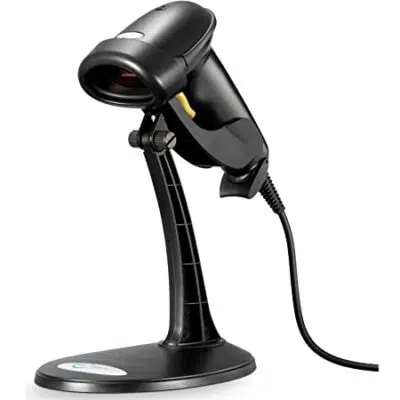Choosing the Right Barcode Scanner for Your Company Demands
Selecting the suitable barcode scanner for your service needs a nuanced understanding of your particular functional requirements and environmental conditions. Elements such as scanner type, speed, and compatibility with existing systems play a critical function in figuring out the best option.
Understanding Barcode Scanner Types
When it comes to picking a barcode scanner, understanding the various types offered is vital for meeting particular business requirements. Barcode scanners can be classified into several kinds, each created for different applications and environments.
Handheld scanners are the most usual, using portability and ease of usage, making them appropriate for retail and stock monitoring. They commonly link through USB or Bluetooth, providing adaptability in operation. Fixed-mount scanners, on the various other hand, are made for high-volume scanning applications, usually discovered in assembly lines or check out counters. These scanners are mounted in a fixed position, enabling rapid scanning of multiple things one by one.
One more kind is the mobile computer, which incorporates scanning abilities with calculating power. These devices are optimal for area operations or warehouse administration, enabling data collection and real-time supply tracking. Furthermore, there are commercial scanners that are built to withstand severe settings, such as extreme temperature levels or exposure to dirt and moisture.

Trick Attributes to Consider
What important attributes should companies prioritize when selecting a barcode scanner? Scanning speed is critical, as faster scanners improve operational efficiency, especially in high-volume atmospheres. The scanner's capability to check out various barcode formats is also vital; guarantee it supports prominent types like QR codes, UPC, and Code 128 to accommodate varied stock items.
Durability is an additional vital attribute, especially for organizations in tough settings. Look for designs that are constructed to hold up against decreases, dust, and dampness. In addition, consider the connectivity choices offered; whether you choose USB, Bluetooth, or Wi-Fi, the best connectivity can boost combination with existing systems.

Analyzing Your Service Atmosphere
To effectively select a barcode scanner, businesses need to take stock of their certain operational atmosphere. This analysis includes examining the physical design of the work area, the nature of the items being scanned, and the typical conditions under which scanning takes place. For instance, a retail atmosphere might require handheld scanners that can swiftly refine transactions at the checkout, while a stockroom setting may profit from ruggedized scanners designed to withstand harsher problems.
Additionally, think about the volume of scanning needed. High-throughput settings might demand advanced scanning technologies, such as redirected here fixed-position scanners or mobile devices that can operate successfully in busy scenarios. The integration capabilities with existing inventory management systems also play a critical duty; make sure the selected scanner can effortlessly about his get in touch with software application platforms in operation.
Additionally, assess the possibility for growth and scalability. A scanner that satisfies present needs might not suffice as business expands. By completely assessing these factors, companies can choose a barcode scanner that not only fulfills instant requirements however likewise supports long-term operational efficiency and adaptability. This tactical method ultimately adds to smoother procedures and boosted performance.
Budgeting for Your Scanner
Having actually examined the operational setting and determined the certain requirements for a barcode scanner, the next action involves mindful budgeting to make sure a smart economic investment. Establishing a budget starts with identifying the total expenses related to the scanner, consisting of initial purchase price, functional expenditures, and prospective upkeep fees.
When choosing a barcode scanner, consider the variety of readily available choices, from handheld gadgets to fixed-position scanners, as rates can vary significantly. It is necessary to balance price with performance; opting for a much more inexpensive design might lead to boosted functional inadequacies if it does not fulfill your company demands.
Along with the equipment, factor in costs connected to software, training, and prospective upgrades. While it could be tempting to minimize in advance expense, buying a top quality scanner that straightens with your functional requirements can yield long-lasting cost savings with boosted performance and lowered downtime.
Finally, consider the total cost of ownership, which encompasses the scanner's lifespan and potential resale value. By meticulously planning your spending plan, you can guarantee that your financial investment in a barcode scanner will certainly enhance your functional performance and financial efficiency.
Integration With Existing Solution
Incorporating a barcode scanner with your existing systems is important for maximizing its performance and making certain smooth procedures. barcodes scanners. A well-integrated scanner enhances operations performance, minimizes mistakes, and speeds up data processing. When picking a barcode scanner, think about compatibility with your present software application and hardware infrastructure, including your supply monitoring systems, point-of-sale (POS) systems, and business resource preparation (ERP) solutions
Assess whether the scanner utilizes conventional protocols such as USB, Bluetooth, or Wi-Fi, which can facilitate very easy combination. Additionally, evaluate whether the scanner's software application offers APIs or SDKs that permit personalization and integration with blog here exclusive systems. This is especially important for organizations with special functional requirements.
As your business grows, your systems must be able to suit added scanners and handle enhanced data quantities without considerable reconfiguration. Eventually, spending in a barcode scanner that effortlessly incorporates with your existing systems will certainly generate lasting advantages, improving precision, effectiveness, and total productivity within your operations.

Conclusion
In verdict, selecting an appropriate barcode scanner necessitates a comprehensive evaluation of numerous variables, consisting of scanner kinds, vital functions, and the particular company environment. Correct budgeting for both procurement and operational costs is important, alongside making sure compatibility with existing systems. By thoroughly thinking about these elements, organizations can improve effectiveness and productivity, inevitably causing boosted functional outcomes. The appropriate barcode scanner functions as an important tool in simplifying processes and helping with effective stock administration.